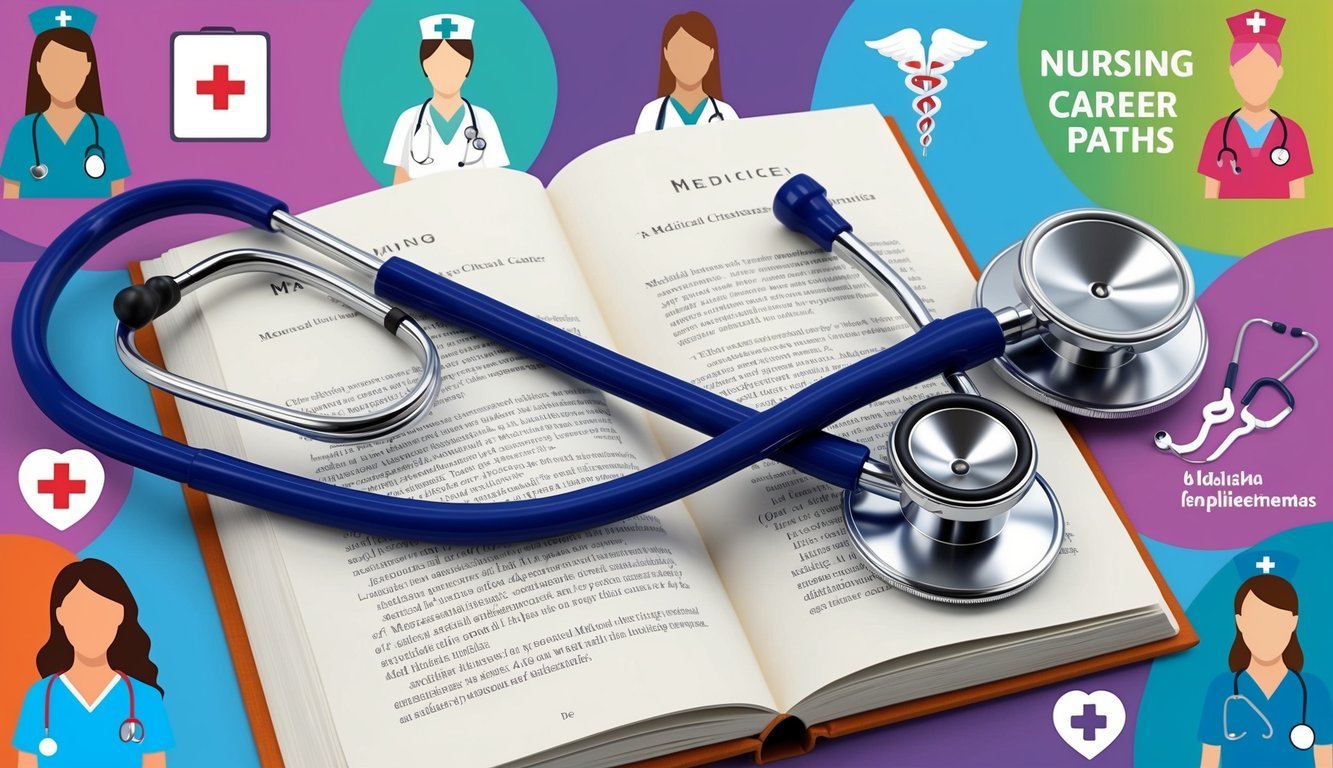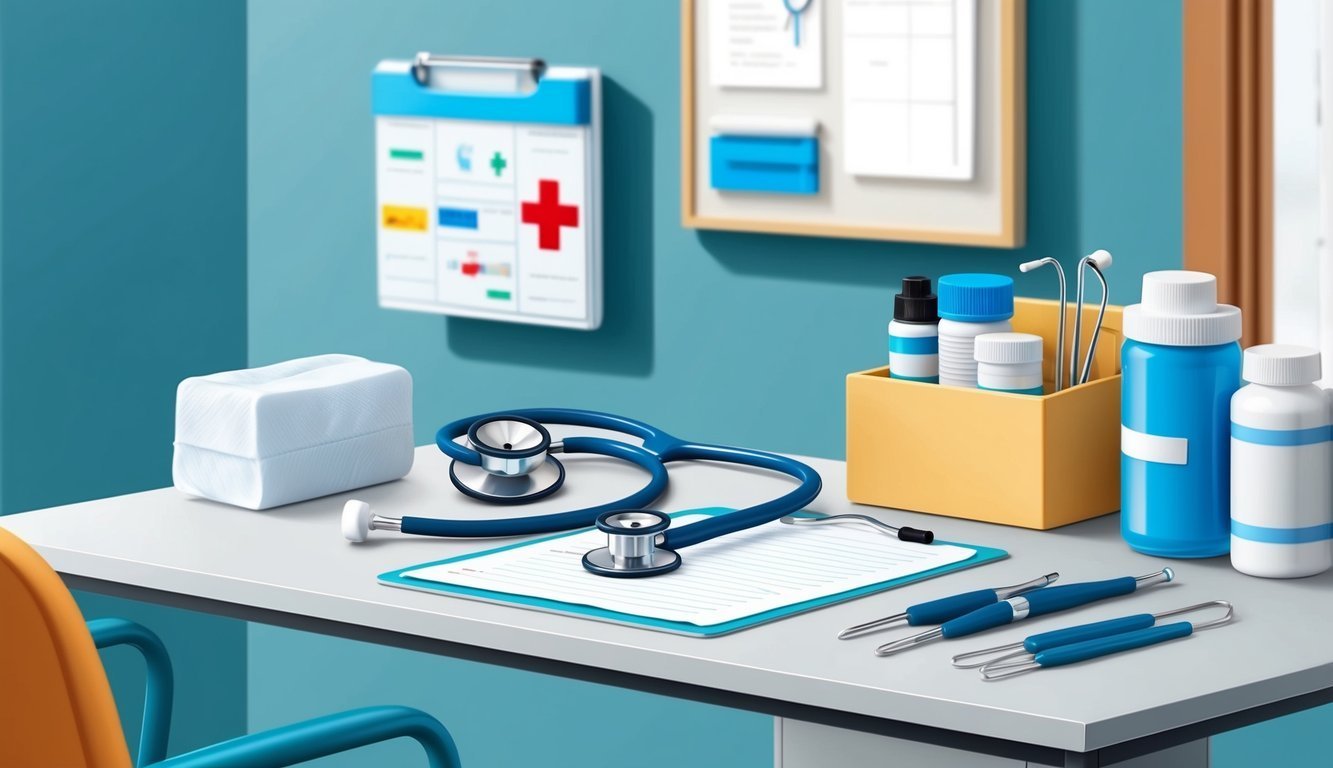Nurse.org is a valuable resource for anyone interested in the nursing field.
It offers comprehensive information on nursing careers, education paths, and the licensure process. Articles written by experienced healthcare professionals provide relevant resources and guidance to help you on your nursing journey.
Whether you’re a student considering nursing as a career or a registered nurse seeking to advance your skills, Nurse.org provides insights into trends and developments in healthcare.
You can explore the various nursing specialties and learn how to navigate the professional landscape, which is crucial in today’s growing healthcare industry.
In addition to career advice, you’ll find essential information to support your professional development.
This includes nursing certifications and resources that enhance your skills and knowledge.
Key Takeaways
- Nurse.org provides essential insights for aspiring and current nurses.
- The site offers information on various nursing specialties and career paths.
- You can find resources for professional development and certifications.
Exploring Nursing Careers

In the nursing field, various career paths offer unique opportunities and responsibilities.
You can pursue roles such as Registered Nurse (RN), Advanced Practice Registered Nurse (APRNs), or specialized nursing roles.
Each path has specific requirements and can lead to rewarding experiences in the healthcare industry.
Registered Nurse (RN)
Registered Nurses (RNs) are crucial to healthcare.
They provide patient care, educate patients, and coordinate treatments.
To become an RN, you typically need to complete an accredited nursing program and pass the NCLEX-RN exam.
RNs work in various settings, such as hospitals, clinics, and schools.
Their responsibilities may include:
- Assessing patient needs
- Administering medications
- Creating care plans
- Collaborating with healthcare teams
You can find nursing job opportunities on platforms like Nurse.org that list openings near you.
Advanced Practice Registered Nurses (APRNs)
Advanced Practice Registered Nurses (APRNs) hold advanced degrees and provide more specialized care.
This group includes Nurse Practitioners (NPs), Clinical Nurse Specialists (CNSs), Nurse Anesthetists (CRNAs), and Nurse Midwives (CNMs).
Each APRN role requires additional education and certification.
For example:
| Role | Education Required | Certification Body |
|---|---|---|
| Nurse Practitioner | Master’s degree in nursing | ANCC or AANP |
| Nurse Anesthetist | Doctoral degree in nursing | NBCRNA |
| Clinical Nurse Specialist | Master’s degree in nursing | ANCC |
APRNs can work independently or alongside doctors, providing essential services like primary care or anesthesia administration.
Specialized Nursing Roles
Specialized nursing roles focus on specific areas of patient care.
These can include positions such as Licensed Practical Nurses (LPNs), Nurse Educators, and Nurse Researchers.
For example, LPNs provide basic nursing care under the supervision of RNs.
Nurse Educators teach nursing students, while Nurse Researchers work to improve patient outcomes through scientific studies.
Specialties may require additional training or certifications.
Resources like EveryNurse.org offer information on various nursing specializations and career paths.
Exploring these careers helps you find the right fit for your skills and interests in nursing.
Nursing Education and Licensure

Nursing education is a critical step in preparing for a successful career in healthcare.
This section outlines the different educational pathways and licensure requirements that you’ll need to navigate in your journey as a nurse.
From CNA to BSN
To start your nursing career, you might begin as a Certified Nursing Assistant (CNA).
This role requires completion of a short training program, typically lasting a few weeks, followed by passing a certification exam.
After gaining some experience, many choose to pursue an Associate Degree in Nursing (ADN) or a Bachelor of Science in Nursing (BSN).
An ADN generally takes about two years, while a BSN is a four-year program.
BSN programs often provide advanced training, including leadership and patient care skills.
Graduates with a BSN can qualify for more job opportunities and higher salaries.
Explore options at accredited nursing programs like nurse.org for your next steps.
Graduate Degrees in Nursing
For those seeking advancement, pursuing a Master of Science in Nursing (MSN) can open many doors.
An MSN allows for specialization in areas like nurse practitioner, educator, or administrator.
These programs typically require a BSN for admission and take around 1-3 years to complete.
You may also consider additional training for doctoral programs like a Doctor of Nursing Practice (DNP).
Graduate education enhances your expertise and improves your competitiveness in the job market.
Many universities offer flexible online options that fit your schedule and lifestyle.
Licensure and Continuing Education
Licensure is a vital requirement to practice as a registered nurse (RN).
After completing your nursing program, you must pass the NCLEX-RN exam.
This test assesses your knowledge and skills necessary for nursing practice.
In addition to obtaining your license, continuous education is essential.
Many states require a certain number of continuing education credits to renew your license.
You should stay informed about state regulations through your Board of Nursing.
Maintaining your licensure ensures you are up-to-date with industry standards and practices.
Engaging in workshops, webinars, and courses can help you fulfill these requirements and advance your career.
Healthcare Industry Insights

In today’s healthcare landscape, understanding current trends and the vital role of nurses is essential.
These insights highlight how the industry is adapting and the impact of nursing on public health efforts.
Current Trends in Healthcare
The healthcare industry is experiencing several key trends that affect patient care and nursing practices.
-
Telehealth Expansion: The pandemic accelerated the use of telehealth, allowing patients to access care from home. This trend is expected to continue, improving access to services.
-
Home Care Services: More patients are receiving care at home. Services such as skilled nursing visits and virtual check-ins are becoming more common. You can read more about home care nursing trends for deeper insights.
-
Emphasis on Mental Health: There is a growing recognition of the importance of mental health. Healthcare providers are integrating mental health services into primary care to treat patients more holistically.
-
Workforce Shortages: There is a notable shortage of healthcare professionals, particularly nursing assistants. By 2028, over 73,000 nursing assistants may be needed. This challenge calls for strategies to attract and retain nursing staff.
Role of Nurses in Public Health
Nurses play a critical role in advancing public health.
They are often on the front lines of health promotion and disease prevention.
-
Health Education: You, as a nurse, provide essential information on health risks and healthy practices. Educating patients on nutrition, exercise, and immunizations can significantly improve community health.
-
Community Outreach: Nurses often engage with communities to identify health needs. For instance, organizing vaccination drives or health fairs helps address local health concerns.
-
Advocacy: Nurses advocate for policies that improve health outcomes. Your work in public health can influence health policy and resource allocation at various levels.
-
Data Collection: Nurses contribute to public health data collection, helping track disease patterns and health trends. This information is vital for shaping effective health strategies.
Nurses are indispensable in fostering a healthier society through their dedication to care and education.
Professional Development

Professional development is crucial for your growth and success in nursing.
It encompasses certifications, specializations, and engagement with professional organizations.
Additionally, leadership and management skills are essential in advancing your career and improving patient care.
Certifications and Specializations
Pursuing certifications can enhance your expertise and open doors for career advancement.
Some key certifications include:
- Family Nurse Practitioner (FNP)
- Acute Care Nurse Practitioner (ACNP)
- Psychiatric-Mental Health Nurse Practitioner (PMHNP)
- Women’s Health Nurse Practitioner (WHNP)
- Certified Registered Nurse Anesthetist (CRNA)
These designations demonstrate your commitment to specialized knowledge and skills.
For example, obtaining your FNP certification can allow you to provide comprehensive care across various settings.
Many organizations, like the American Nurses Association, offer resources to help you prepare for these exams.
Professional Organizations
Joining professional organizations can provide you with valuable resources and networking opportunities.
These organizations keep you informed about industry trends and offer continuing education programs.
Some notable organizations include:
- American Nurses Association (ANA)
- American Association of Nurse Practitioners (AANP)
- National Association of Clinical Nurse Specialists (NACNS)
These groups often provide access to conferences, webinars, and publications tailored for nursing professionals.
Engaging with these organizations can enhance your knowledge and support your career advancement.
Leadership and Management
Developing leadership and management skills is essential in nursing.
These skills help you influence change, improve healthcare practices, and promote patient safety.
Consider pursuing leadership training programs or workshops, which may focus on:
- Effective communication
- Conflict resolution
- Team management
These skills not only enhance your career prospects but also prepare you for higher responsibilities in clinical settings.
Becoming a leader in nursing enables you to contribute positively to your workplace and mentor the next generation of nurses.
Resources for Nursing Professionals

As a nursing professional, having access to the right resources is key to your success.
Here are valuable tools and platforms to enhance your career:
| Resource Type | Description | Link |
|---|---|---|
| Educational Resources | Access courses and guides to improve your skills. | Nursing Resources from ANA |
| Up-to-Date Information | Stay informed with the latest developments in nursing. | Nursing News |
| Networking Opportunities | Connect with other healthcare professionals. | Nursing Organizations |
| Career Development | Find job openings and advance your career. | ANA Career Center |
These resources provide you with essential tools to grow in your field.
Make sure to utilize online platforms like Nurse.org for trending topics and comprehensive guides.
Joining professional nursing organizations can also enhance your network and provide support.
Staying current with industry news is important.
Subscribe to newsletters or follow key websites to get timely updates.
By leveraging these resources, you can foster continuous growth and stay at the forefront of nursing practice.
Frequently Asked Questions
This section addresses common questions about nursing careers.
You will find specific information regarding credentials, advancements, roles, demand, benefits, challenges, and the importance of continuing education in nursing.
What credentials are necessary for becoming a Registered Nurse?
To become a Registered Nurse (RN), you need to earn an Associate Degree in Nursing (ADN) or a Bachelor of Science in Nursing (BSN).
After completing your degree, you must pass the NCLEX-RN exam to obtain your nursing license.
How can one advance their nursing career to a specialty with higher pay?
Advancing your nursing career often involves pursuing further education and certifications.
Specialties such as Nurse Practitioner (NP) or Clinical Nurse Specialist (CNS) can lead to higher pay.
You can also gain experience and take on leadership roles to increase your earning potential.
What are the various nursing roles and their respective responsibilities?
Nursing roles vary widely, including:
| Role | Responsibilities |
|---|---|
| Registered Nurse (RN) | Administering medications, coordinating with healthcare teams |
| Nurse Practitioner (NP) | Diagnosing and treating illnesses, prescribing medications |
| Clinical Nurse Specialist | Providing expertise in specific areas, such as pediatrics or emergency care |
| Nurse Educator | Teaching nursing students and conducting research |
Which nursing specialties are in highest demand?
Some in-demand nursing specialties include:
- Emergency Room Nursing
- Gerontology Nursing
- Pediatric Nursing
- Critical Care Nursing
These areas often have a shortage of qualified professionals, leading to more job opportunities.
What are the benefits and challenges of a career in nursing?
Benefits of nursing include job stability, diverse work environments, and the ability to make a significant impact on patient lives.
Challenges may involve long hours, emotional stress, and physical demands of the job.
How does continuing education impact a nursing professional’s career?
Continuing education is vital for career advancement in nursing.
It helps you stay current with medical practices and can lead to new certifications and specializations.
This keeps your skills sharp and improves your job performance.

